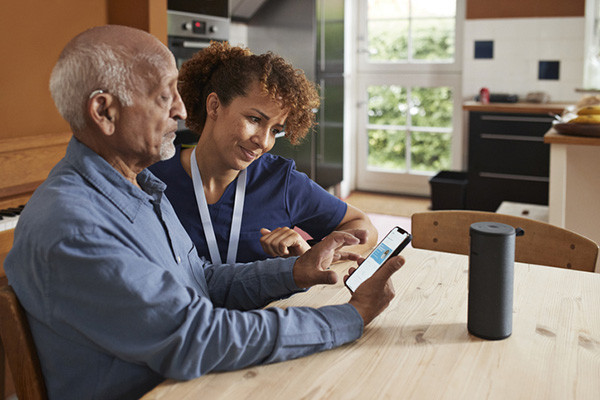Easy, delicious summer veggie meals will help stretch your food budget
Tracking viruses: The best clues may be in the sewer
Promising therapy if PSA rises after prostate cancer surgery
Should you try intermittent fasting for weight loss?
Why are you taking a multivitamin?
Could eating fish increase your risk of cancer?
Can music improve our health and quality of life?
Millions rely on wheelchairs for mobility, but repair delays are hurting users
Waist trainers: What happens when you uncinch?
Preventing C. diff in and out of the hospital
Mind & Mood

It can be devastating to watch older adults struggle with memory problems, low mood, anxiety, or a lack of motivation, particularly during times of physical distancing. With waiting lists for mental health appointments stretching for months, you may be wondering about alternatives.
Reaching out to family members or faith leaders may be helpful in talking through stressors. Alternatively, self-help books may provide skills or a new perspective for older adults choosing to keep their struggles private. But with the explosion of mental health mobile applications, telepsychiatry services, social media, and wearable technologies, where does technology fit in with treatment?
Seeing your loved one struggle with their computer, you may wonder whether to pursue technology-based treatments in the first place. Although older adults may be reluctant to use new technology due to stereotype threat (the fear of confirming negative stereotypes), a little help from loved ones can ease technology discomfort. The adoption of technology has grown rapidly over the past decade among older adults, and with it have come potential benefits to mental health, daily functioning, and quality of life.
A couple of years into the pandemic, older adults are increasingly seeing their doctors virtually. How well does this work for mental health? Thankfully, several studies have shown that virtual therapy is comparable to in-person treatment.
What about mobile apps that remove the human component? Here the data suggest that mobile apps can be complementary, although they are not sufficient as standalone treatments for mental illnesses.
When navigating online treatments, you want to ensure that the platform used is HIPAA (Health Insurance Portability and Accountability Act)-compliant, which means your information is protected by law. Zoom and BlueJeans are HIPAA compliant; FaceTime and Skype are not. When using mental health mobile apps, read the privacy policies: red flags include sharing or selling information to third parties and using your information for advertisements.
Navigating the explosion of mental health apps for online treatment can be tricky, as the landscape is changing quickly. For teletherapy services, Teladoc, K health, and Doctor on Demand are good places to start.
To supplement treatment of common mental illnesses, wellness apps developed by the federal government (including Mindfulness Coach, COVID Coach, and CBT-i Coach) can help teach skills, manage sleep, and track symptoms. Medisafe is the top-ranked medication reminder app for good reason: it has excellent privacy features (and with the premium subscription, you can receive medication reminders in celebrity voices).
We know that physical activity has numerous benefits on brain health in old age: it reduces anxiety and stress, it improves depressive symptoms, and it even strengthens learning and memory. Wearable technologies can play a role in helping older adults set physical activity goals. Through the use of smartwatches (which use accelerometers to keep track of movements), older adults can monitor how many steps they take, how many calories they burn, and even how well they sleep at night.
Wearable technologies have advantages for caregivers as well. They can be used to monitor their loved ones for wandering and falls, and they can alert them to changes in mood: a significant increase or decrease in usual activity levels may herald early signs of depression or anxiety.
New research suggests that technology can indeed improve prospective memory, and help older adults with mild cognitive impairment continue their daily activities. Through the use of a personal assistant application on their smartphone (a digital voice recorder or reminder app), older adults who received reminders about events and activities experienced memory benefits and improvements in their activities of daily living.
While the benefits and harms of using technologies are still being studied, you can try the following:
If mental health technology doesn’t suit your loved one, that’s okay — technology is not always the answer. Treatments are most likely to work when patients believe it will help and can stick with it.
Stephanie Collier, MD, MPH, Contributor
As a service to our readers, Harvard Health Publishing provides access to our library of archived content. Please note the date of last review or update on all articles.
No content on this site, regardless of date, should ever be used as a substitute for direct medical advice from your doctor or other qualified clinician.
Post a comment: Log in and leave a comment of your own.
Mind & Mood
Mind & Mood
Mind & Mood
Get the latest in health news delivered to your inbox!
© 2022 by The President and Fellows of Harvard College
Do not sell my personal information | Privacy Policy
Thanks for visiting. Don’t miss your FREE gift.
The Best Diets for Cognitive Fitness, is yours absolutely FREE when you sign up to receive Health Alerts from Harvard Medical School
Sign up to get tips for living a healthy lifestyle, with ways to fight inflammation and improve cognitive health, plus the latest advances in preventative medicine, diet and exercise, pain relief, blood pressure and cholesterol management, and more.
Health Alerts from Harvard Medical School
Get helpful tips and guidance for everything from fighting inflammation to finding the best diets for weight loss…from exercises to build a stronger core to advice on treating cataracts. PLUS, the latest news on medical advances and breakthroughs from Harvard Medical School experts.
BONUS! Sign up now and
get a FREE copy of the
Best Diets for Cognitive Fitness
Stay on top of latest health news from Harvard Medical School.
Plus, get a FREE copy of the Best Diets for Cognitive Fitness.
